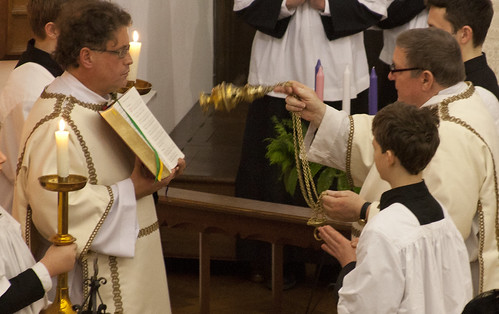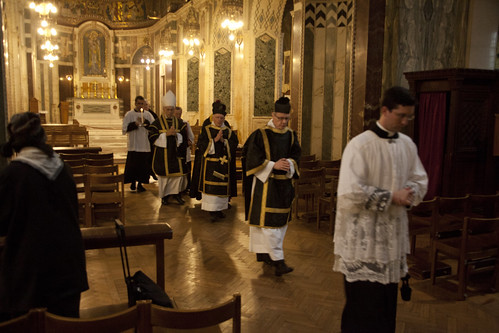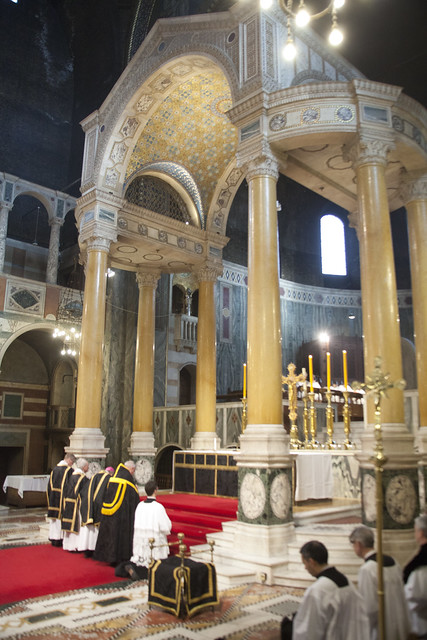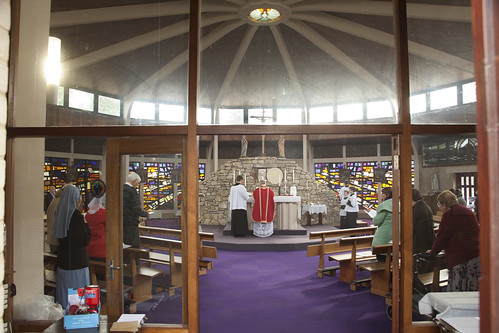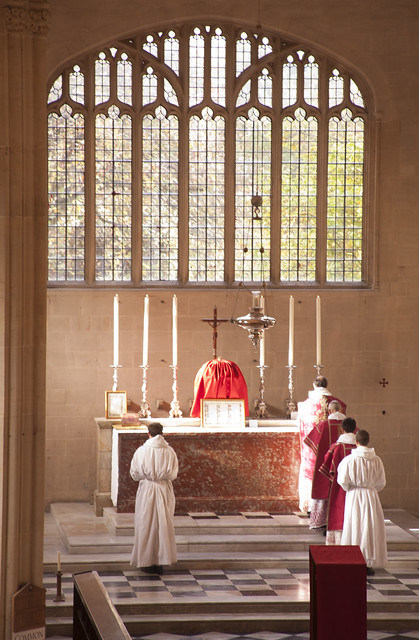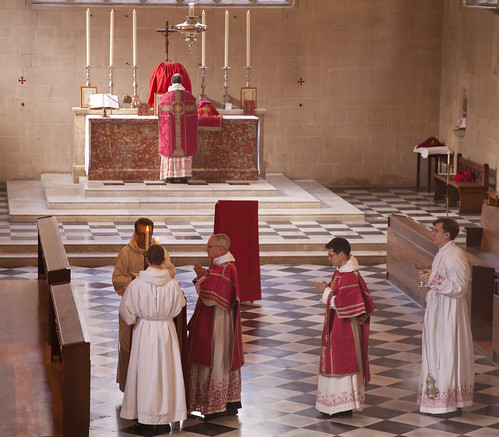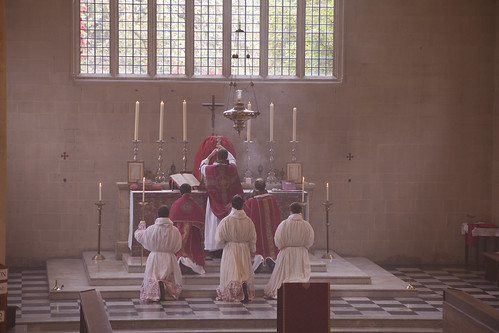I'm reposting this from March 2014, inspired by seeing one of the arguments I address below used on social media somewhere. (By someone who apparently hadn't heard of Savoranola, Dante, or Robert Grosseteste.) 2014 seems like a lifetime ago, but although I have criticised Pope Francis since then I stand by the principles I set out back then, which explain the on-going policy of this blog about how to handle difficult issues surrounding Pope Francis.
------------------------------------------------
Michael Voris thinks not. His arguments are interesting but don't work.
First, he says that to criticise the Pope causes scandal, sharply contrasting this with criticism of bishops and Cardinals. (First silly point: there is no sharp contrast. What is true of one is to a large extent true of the other.) That there is a danger of causing scandal is true, but it is also true that, in certain circumstances, not criticising the Pope causes scandal. It is lucky for us today that St Catherine of Siena and Savoranola and Dante and Robert Grossteste criticised the popes of their day, because they prove that not all Catholics are guilty of Papolatry: that it is not necessary to have your conscience surgically removed to become a member of the Mystical Body. They are our defence against some of the most insistent and damaging polemics, developed by Protestants and re-used by Secularists, against the Church. To use a phrase of Pope Francis, when I encounter a clericalist, it makes me feel anti-clerical.
Voris then turns to the counter-argument that saints have criticised Popes. In an astonishing inversion of logic, he says that they could legitimately criticise Popes because they were saints.
First, this misses the point, which was not that only saints are widely regarded as being justified in their criticisms of Popes (see my short list above: plenty of others have been too), but that this widespread judgement can't be too off the mark because even saints criticised popes.
Secondly, it would be strange to suggest that St Catherine and St Paul and the other saints had to ask themselves if they were holy enough to carry out their obligations. That way only egomaniacs will criticise the Pope, and that won't be progress.
The wider point is well made by no less that the Supreme Legislator himself, in Canon Law: even the laity can have the right and indeed the duty to voice their concerns about their pastors. The Pope is not excepted.
Canon 212 sec. 3, the laity has "the right and even at times the duty to manifest to the sacred pastors their opinion on matters which pertain to the good of the Church and to make their opinion known to the rest of the Christian faithful, without prejudice to the integrity of faith and morals, with reverence toward their pastors, and attentive to common advantage and the dignity of persons."
I don't say this because I am about to embark on a lot of blogging criticising the Holy Father. I just think it is important to oppose grossly distorted understandings of Catholic teaching wherever I see them, to the best of my ability, because, to coin a phrase, they cause scandal.
As far as criticising Popes is concerned, I would in practice urge great caution.
First, any criticism which comes across as personal, or as mocking or insulting, is inappropriate to a person holding his high office. That is because the office is holy, even if not all holders of the office are holy. The office is august, it commands our respect. The holder does not become impeccable - incapable of sin - but it does mean that any criticism is a serious matter, and should be undertaken, if at all, in a serious way. This of course is part of what the canon says.
I do, incidentally, think that mockery, ridicule and even invective can sometimes be appropriate: I'd be in trouble if I didn't, since Our Lord used them, and so did many prophets, Fathers of the Church, saints, and apologists down the ages. They are useful to take people worthy of ridicule down a peg or two. The Pope, however, is never ridiculous. When he is wrong, things are too serious for that.
Secondly, as with others in very exalted offices, but very much more so, it is difficult to separate what is personal to the Pope from what is the initiative of advisors and office-holders. He does have the fearful ultimate responsibility - true - but as initiatives and policies develop from day to day it is impossible, at least for those of us without inside information, to know what is the Pope's idea, what is his speechwriter, what comes from (good, bad, or indifferent) briefings given to the Pope, and what are the actions of his Cardinals and other ministers.
For example, I was astonished to read that Pope Paul VI approved the new Lectionary without giving it prolonged attention, and actually said so. He trusted his advisers. If this was an error, it was not the same error as the error (say) of deliberately excluding 1 Corinthians 11:29 (about the sin of receiving Communion unworthily) from the Lectionary, when it had previously been read on Maundy Thursday and Corpus Christi. Being too trusting is not the same fault as not taking seriously the importance of being well prepared for Holy Communion. If people had laid into Pope Paul for the second thing in 1970, they would have been barking up the wrong tree.
Far better, therefore, to voice concerns, if there are legitimate concerns, about policies, about new regulations or liturgical texts or other documents, but without turning it into a personal attack on the Holy Father.
We are sometimes told that being 'over critical' of the Pope or bishops is the besetting sin of traditionalists. As a matter of fact, this is not true. Not only do liberal Catholic publications like The Tablet attack the pope all the time (yes, including Pope Francis), but many Catholic organisations down the years who had no particular connection with the Traditional Mass have, for one reason or another, ended up associated with criticisms of the hierarchy.
The classic example is Aid to the Church in Need, which used to criticise the appeasement of Communism which was the official Vatican policy under Pope Paul VI. More recently, the headline cases have been Pro Ecclesia and SPUC. Now we have Deacon Nick Donnelly being hauled over the coals, for what we can assume is the same thing. I don't say these criticisms were not justified, or that they were not expressed in the best ways: that would be a long discussion. I've just said that criticism isn't ruled out in principle, so the matter is an open one. My point is simply that the Traditional Mass was nothing to do with it.
Critics of traditionalists have become confused by the fact that until Summorum Pontifcum it was such open season on trads and any old stick was good enough to beat them. But once you take away the assumption that support for the Traditional Mass is itself an act of personal disloyalty to the Pope, then you can allow yourself to notice that established traditionalist organisations like the Latin Mass Society and the Una Voce Federation are, and always have been, models of diplomacy and restraint.
They combine this respect for the hierarchy with a complete adherence to the unchanging teaching of the Church, not out of any superficial ultramontanism (whatever the Pope said about his breakfast is the latest infallible doctrine), but because of their attachment to Tradition. This is something I want to develop in future posts.
Labels
- Bishops
- Chant
- Children
- Clerical abuse
- Conservative critics of the EF
- Correctio Filialis
- FIUV Position Papers
- Fashion
- Freemasonry
- Historical and Liturgical Issues
- Islam
- Liberal critics of the EF
- Marriage & Divorce
- Masculinity
- New Age
- Patriarchy
- Pilgrimages
- Pope Francis
- Pro-Life
- Reform of the Reform
- Young people
Friday, December 29, 2017
Tuesday, December 26, 2017
Happy Christmas to all my readers!
Puer natus est nobis.
And a reminder that the Christmas season goes on till... 2nd February, the feast of the Purification of Our Lady (Candlemas). If you follow the Traditional calendar.
Support the work of the LMS by becoming an 'Anniversary Supporter'.
Tuesday, December 19, 2017
Islam and the Extraordinary Form
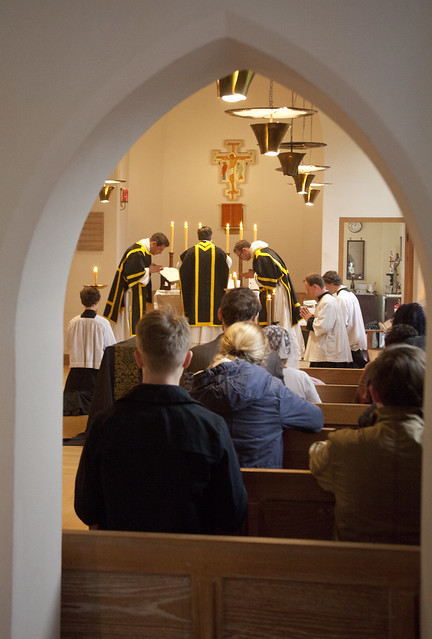 |
| A glimpse of a transcendant mystery. |
It sets out a very simple argument which seems difficult to deny. It goes like this.
1. Engagement with Islam (whether with a view to mutual understanding or evangelisation) is facilitated by common ground with Islam. The more common ground one has, whether cultural or theological, the better one can talk productively with people of other religions.
2. There is a great deal more common ground between Islam and that aspect of Catholicism exemplified by the Traditional liturgy, than there is between Islam and what is manifested by the reformed liturgy. In this, the Traditional Catholics are close to the situation of the ancient Christian churches in majority-Muslim countries.
Saturday, December 16, 2017
Shakespeare on the Traditional Mass
The idea that Shakespeare was a secret Catholic, and put coded messages into his plays about the Faith, is so attractive to me as a Catholic and a lover of Shakespeare that I have to be careful about confirmation bias. However, as I've noted before on this blog, Clare Asquith (in Shadowplay) and others have made a very serious historical case for it. Once you see it, you can't look at the plays in quite the same way again.
Friday, December 15, 2017
Pierantoni answers Buttiglione
This article by Prof Claudio Pierantoni, one of the signatories of the Filial Correction, is very helpful, certainly to me, not least because Pierantoni expresses the problem in a way slightly differently from the way I have been doing. Pierantoni is a long-term acquaintance of Rocco Buttiglione, and not only knows his thinking well and sympathetically, but has corresponded with him on these precise issues.
Here is a key passage; do go over to LifeSite to see the whole thing.
Here is a key passage; do go over to LifeSite to see the whole thing.
-----------
Buttiglione writes:
There are therefore some cases in which remarried divorcees can (through their confessor and after suitable spiritual discernment) be considered to be in God’s grace and therefore deserving of receiving the sacraments. It seems a shocking novelty, but it is a doctrine that is entirely, and I dare say rock-solidly, traditional.
Note the rush and superficiality (certainly not justified by the mitigating circumstance of a lack of intelligence) with which Buttiglione jumps to the twofold consequence: in the first passage, he draws from the general doctrine of extenuating circumstances the immediate consequence that “remarried divorces can be considered to be in God’s grace.” With this, he skips over the strong objections that we critics have raised without even responding to them.
Labels:
Amoris laetitia,
Correctio Filialis,
Pope Francis
Monday, December 11, 2017
More thoughts about the Buenos Aires letter: on ecclesial politics
With apologies to my readers, my thoughts have been particularly slow in forming on this blog in recent days. Still, further to my last post, here's a couple more: about the impact of this move on ecclesial politics.
A while ago I was asked by a journalist to comment on an article in L'Ossovertore Romano by Cardinal Ouellet, so I looked at this in some detail. Ouellet, like Cardinal Mueller, has been consistently putting out a very careful 'conservative' interpretation of Amoris laetitia. It is not so very different from the interpretation I gave on this blog when Amoris first came out.
His strategy has four parts.
1. He criticises conservatives worried about AL as misinterpreting it.
2. He also rejects those interpretations of AL which allow reception of Holy Communion, in circumstances condemned by the previous discipline, as misinterpretations ‘equally… (if not more so)’.
3. He stresses that what is really important in ‘pastoral accompaniment’ is listening and counselling, not access to the sacraments.
4. When he does turn to cases of access to the sacraments, his description of legitimate cases is such that they could be allowed under Pope St John Paul II’s Familiaris consortio.
A while ago I was asked by a journalist to comment on an article in L'Ossovertore Romano by Cardinal Ouellet, so I looked at this in some detail. Ouellet, like Cardinal Mueller, has been consistently putting out a very careful 'conservative' interpretation of Amoris laetitia. It is not so very different from the interpretation I gave on this blog when Amoris first came out.
His strategy has four parts.
1. He criticises conservatives worried about AL as misinterpreting it.
2. He also rejects those interpretations of AL which allow reception of Holy Communion, in circumstances condemned by the previous discipline, as misinterpretations ‘equally… (if not more so)’.
3. He stresses that what is really important in ‘pastoral accompaniment’ is listening and counselling, not access to the sacraments.
4. When he does turn to cases of access to the sacraments, his description of legitimate cases is such that they could be allowed under Pope St John Paul II’s Familiaris consortio.
Tuesday, December 05, 2017
Some thoughts about the Buenos Aires letter
In this post I address two questions.
The first is: what does it mean for Pope Francis to promulgate his letter to the Bishops of Buenons Aires, on their guidlines for the application of Amoris laetitia, in the Acta Apostolicae Sedis (AAS), the official record of Papal acts?
The second question is: does this procedure create an obligation on Catholic to believe something they were not previously obliged to believe?
Saturday, December 02, 2017
Friday, December 01, 2017
Mgr Loftus: pro-lifers are 'terrorists'
 |
| Archbishop Joseph Naumann of Kansas |
His column is, as usual, both bizarre and incoherent. Remember, as you read it, that the Catholic Times is sold in the backs of Catholic churches every weekend: this is a newspaper, in other words, with ecclesiastical approval. I transcribe the key section for the record, since the paper has no online presence, even for subscribers.
No-one is more supportive [than Pope Francis] of the rights and paramountcy of all marginalised people, including the unborn - but he is totally opposed to the purportednly pro-life antics of men such as Archbishop Naumann, the recently elected head of the American bishops' 'pro-life committee'.
Thursday, November 30, 2017
The Psychology of Traditionalism
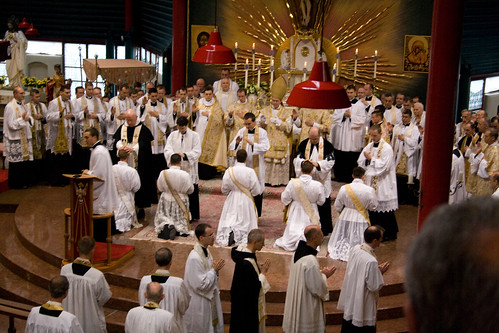 |
| Ordinations for the Fraternity of St Peter in Wigratzbad in 2009 |
Guide to this series:
The Psychology of the Rigid Personality
The Psychology of Military Incompetence
The Psychology of Ecclesiastical Incompetence
The Psychology of Traditionalism
Before my series of posts about Norman Dixon's Psychology of Military Incompetence, I'd been writing about Mgr Basil Loftus, who exemplifies the attitude that respect for rules indicates a conformist, 'anal', weak-ego individual. This inference enables him, and many others, to conclude that theological and liturgical conservatism and traditionalism manifests a kind of 'rigidity' incompatible with pastoral effectiveness.
I have shown what is wrong with this argument in general terms. It is a truism that people with weak egos and an unhealthy fear of failure will be risk-averse, and will seek the approval of their peers and superiors by conforming. In the post-conciliar situation, however, this approval is not forthcoming to conservatives and traditionalists in mainstream Catholic or non-Catholic institutions: it is, rather, given to those who toe the liberal line. It is rather remarkable that Loftus and his like have not noticed this, but as I have observed that classical presentations of the psychological theory they draw from, including Norman Dixon's, are prone to confuse the risk-taking non-conformism of a person with a strong ego and moral courage, with the liberal violation of traditional norms, and with the norm-violation of the merely self-indulgent.
Wednesday, November 29, 2017
The psychology of Ecclesiastical Incompetence
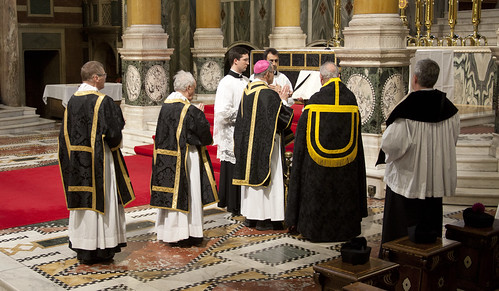 |
| Bishop Mark Jabale at the LMS Annual Requiem in Westminster Cathedral |
Guide to this series:
The Psychology of the Rigid Personality
The Psychology of Military Incompetence
The Psychology of Ecclesiastical Incompetence
The Psychology of Traditionalism
The tensions just described are built into the nature of things, and so the psychology of the use of authority in the Church, and especially in seminaries, could remain constant, in certain ways, through the Vatican II revolution. Institutions which had been taken over by conformists under the Old Regime could change their theology without, necessarily, changing their psychological dynamic, for the New Regime. Liberals might think that their 'let-it-all-hang-out' ideology had banished the authoritarianism/ conformism pattern of the past, but it didn't: it simply meant that instead of conformism meaning slavish adherence to late 19th century neo-scholasticism and the ruthless weeding out of liberals, it now meant slavish adherence to Hans Kung and his friends and the ruthless weeding out of conservatives. And indeed, since the products of such a system were priests who were conformists first, and conservatives or liberals second, a change of ideology would not even necessarily require a change of personnel.
I put forward these theoretical observations as a way to interpret certain historical patterns. Not all Catholic seminaries and communities were or are the same; nor were all the products of these institutions the same, with people bucking the trend in both good and bad ways. Nevertheless, I think few will dispute generalisations such as the following:
Tuesday, November 28, 2017
The Psychology of Military Incompetence
 |
| The last stand on the retreat from Kabul (Wikipedia) |
Guide to this series:
The Psychology of the Rigid Personality
The Psychology of Military Incompetence
The Psychology of Ecclesiastical Incompetence
The Psychology of Traditionalism
I described how this observation has been applied in a one-sided way, by looking for conformism solely in terms of strict adherence to traditional rules. If attention is fixated upon this specific model of conformism, then it can seem inconceivable that a person opposed to traditional morality or social forms could be a conformist. This is the state of mind of seminary rectors, for example, who see theological or liturgical conservatism in seminarians as prima facie evidence of a weak ego, which would in turn indicate that the seminarians in question would be incapable of the flexibility of mind necessary for pastoral work.
This also seems to be the way that Pope Francis thinks. I don't want to pick him out, however: this is a very widespread attitude among senior clerics of his generation. The situation in seminaries and religious communities is beginning to change as a result of the retirement of this generation.
Monday, November 27, 2017
The Psychology of the 'rigid' personality
Guide to this series:
The Psychology of the Rigid Personality
The Psychology of Military Incompetence
The Psychology of Ecclesiastical Incompetence
The Psychology of Traditionalism
I was stopped in my tracks by one passage, a quotation (p254). It is from Peter Kelvin, The Bases of Social Behaviour, 1970. He is talking about the 'authoritarian' personality. (Elipses are Dixon's.)
These tendencies reflect on a type of individual who needs to feel that his environment is highly predictable ... he needs to know where he stands; and so he fastens on to norms: he does not 'let himself go', for fear of where this might lead; he looks to authority as a guide ... [He also] relies very heavily on stereotypes in [his] perception of the social environment. Moreover, the stereotypes used by an authoritarian personality tend to be very clear-cut, and the characteristic infelixibility of this personality leads to relative inability to modify the stereotype once it has been formed.
This is a concise characterisation of what progressives, in the Church and outside it, in the 1960s and 1970s, thought was wrong with their opponents. It also seems to match what Pope Francis has in mind when he talks about 'rigid' people. We don't have to imagine that he ever read Kelvin: these ideas which were widespread when the Holy Father was at an impressionable age.
Sunday, November 26, 2017
Loftus on sacrality
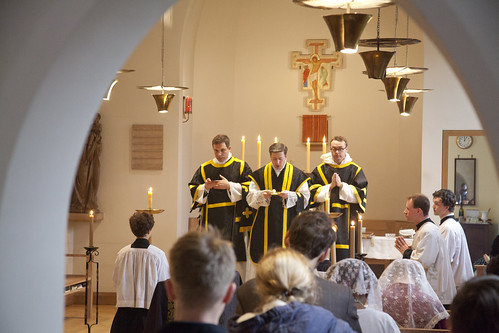 |
| A glimpse of something a bit different from the everyday world. |
How can we tolerate, let alone encourage,
alternative and extraordinary forms of worship within the parameters of the
Catholic Church, whether in the extraordinary form of Mass or in personal
ordinariates, where the ‘clamour’ or pomp now rightfully being expunged from
the Church lingers on? At the moment this is only a question. It may well soon
become a real problem.
This aggressive attitude alternated for a time with expressions of a live-and-let-live philosophy, which of course has for the most part been Pope Francis' own, on liturgical matters. In his more recent columns, however, Loftus has taken a more consistently hostile view of all liturgical developments which aim at what we might call a resacralised liturgy. The 2011 translation of the Ordinary Form is an example upon which he constantly harps; others include the 'Benedictine arrangement' of candles on the altar when the priest celebrates 'facing the people' (i.e. the traditional 'big six' candles, plus crucifix, obscuring the people's view of the priest); the use of Latin; the non-use of Altar girls; the Traditional Mass; and above all the celebration of Mass ad orientem, with the priest and people facing the same way, east.
Saturday, November 25, 2017
Update on Mgr Loftus
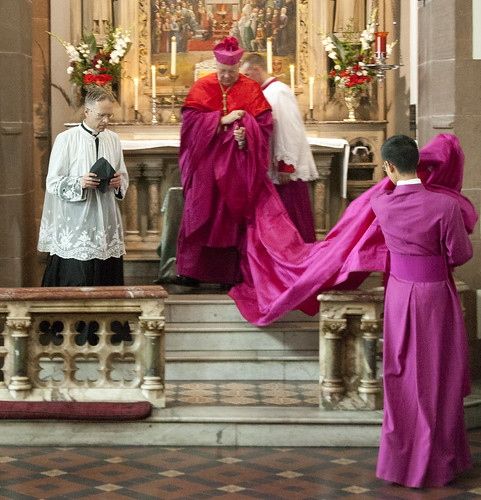 |
| Eat your heart out, Basil. That's Archishop Malcolm McMahon of Liverpool with the FSSP in Warrington, about to ordain two of their men priests. |
Long-term readers may recall that at that time I prepared a dossier of his jems, and I didn't keep this document to myself. Reviewing my ever-growing paper archive of his columns since then, it is clear that this had some effect. Mgr Loftus must have been given some kind of warning by person or persons of authority, whether it be bishops or the Editor of the Catholic Times in which his screeds are published. So my project was not a waste of time.
Friday, November 24, 2017
Prayers for Advent and Christmas: Booklet

If you want to mark Christmas as a spiritual, and not merely bodily, feast, then buy this booklet of traditional prayers for the season, compiled mainly from the Raccolta, the old manual of indulgenced prayers.
My particular favourite is a Novena from the 16th to the 24th 'of any month', in honour of the nativity. It obviously has special appropriateness in December, and maintains the spiritual character of the busiest part of Advent.
The LMS on-line shop has a big range of Catholic items for Christmas: cards, advent calendars, nativity scenes, books and gifts. Go and have a look!
And if you are a member, don't forget to log in to get your 5% discount.
From the booklet's contents page:
CONTENTS
A Note on Indulgences
Pious Exercises
Prayers in Honour of the Nativity of Our Lord
Novena
Sequence of Prayers
Prayers for the Feast of Christmastide
The Nativity of Our Lord
The Circumcision & The Holy Name
The Epiphany
The Holy Name of Jesus
Litany
Other Prayers
Prayers From Other Sources
Blessing of the Advent Wreath
Alma Redemptoris Mater
Prayers Before the Crib
The Holy Innocents
Support the work of the LMS by becoming an 'Anniversary Supporter'.
Thursday, November 23, 2017
Disappearing 'Catholic Guilt' or disappearing Catholics?
Reposted from March 2013. This reflects the ecclesial situation before Pope Francis, but the observations about the nature of the 'Catholic population' identified in surveys is still relevant.
--------------------------------------------------
The Sensible Bond draws attention to a little-reported survey of attitudes which claims that Catholics feel little or no more compunction about immoral behaviour than the general population. He links that to the recent scandal about Cardinal O'Brien - which is very interesting, but here I'm just going to focus on the survey.
The Religion and Society Programme of the University of Lancaster has a helpful page with details of a long list of 'research findings'. The stuff about Catholic guilt is not to be found there, however, but in a press release. It is based, not on a study by sociologists, but an opinion poll by YouGov. The sample size of more than 4,400 sounds impressive, but it was conducted over the internet, and they only reached 391 self-described Catholics. This self-description, translated, in the Press Release, into the term 'practicing Catholic', comes down to whether they 'currently engage in religious or spiritual practices with other people, for example attending services in a place of worship or elsewhere, or taking part in a more informal group', where the 'group' etc. is Catholic for 'Catholics', or Anglican for 'Anglicans'. There is no reference to frequency of this vague spiritual interaction, so it would presumably include non-baptised people who go to their late work-colleagues' Catholic funerals once a decade. And if readers don't know a lot of serious-minded Catholics who'd never find themselves filling in an on-line poll, they need to get out more.
--------------------------------------------------
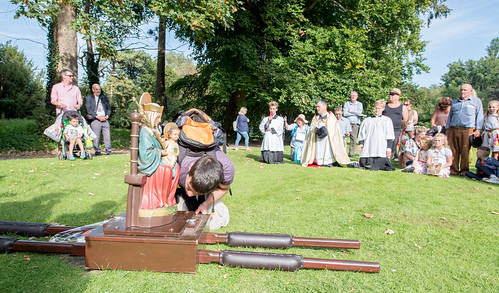 |
| Venerating Our Lady of Walsingham at the conclusion of the LMS Pilgrimage |
The Religion and Society Programme of the University of Lancaster has a helpful page with details of a long list of 'research findings'. The stuff about Catholic guilt is not to be found there, however, but in a press release. It is based, not on a study by sociologists, but an opinion poll by YouGov. The sample size of more than 4,400 sounds impressive, but it was conducted over the internet, and they only reached 391 self-described Catholics. This self-description, translated, in the Press Release, into the term 'practicing Catholic', comes down to whether they 'currently engage in religious or spiritual practices with other people, for example attending services in a place of worship or elsewhere, or taking part in a more informal group', where the 'group' etc. is Catholic for 'Catholics', or Anglican for 'Anglicans'. There is no reference to frequency of this vague spiritual interaction, so it would presumably include non-baptised people who go to their late work-colleagues' Catholic funerals once a decade. And if readers don't know a lot of serious-minded Catholics who'd never find themselves filling in an on-line poll, they need to get out more.
Tuesday, November 21, 2017
Seasonal offerings in the LMS Shop
Reposted.
---------------
Now available is the famous Latin Mass Society Ordo, which has all the feasts of England and Wales as well as the Universal Calendar;
Our indispensible Wall Calendar with its unique design to give you more space to write things into the dates and lots of photos;
Christmas cards with four different classical paintings of the Nativity and a proper seasonal greeting inside.
Get yours now!
Support the work of the LMS by becoming an 'Anniversary Supporter'.
---------------
Now available is the famous Latin Mass Society Ordo, which has all the feasts of England and Wales as well as the Universal Calendar;
Our indispensible Wall Calendar with its unique design to give you more space to write things into the dates and lots of photos;
Christmas cards with four different classical paintings of the Nativity and a proper seasonal greeting inside.
Get yours now!
Support the work of the LMS by becoming an 'Anniversary Supporter'.
Monday, November 20, 2017
The Traditional Movement and orthodoxy: Chairman's message
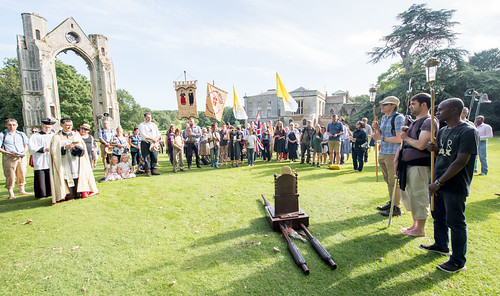 |
| The Latin Mass Society pilgrimage to Walsingham, at the site of the Holy House |
----------------
It might be thought that
it would be better for those attached to the Extraordinary Form to travel
light, and not associate their cause with anything else controversial: to fight
one battle at a time. I know that this is not how the Latin Mass Society’s
members and supporters usually feel, however. On the contrary, while the case
for the holiness and beauty of the Vetus
Ordo can stand on its own feet, the Mass we love points beyond itself, to
the God it worships and the praying Church which it serves. It points not only
to the theological truths it teaches directly, like the communion of Saints,
and the reality of sin and grace, but to the antiquity, majesty, and authority,
of the Church’s teaching in general.
Sunday, November 19, 2017
Photos of St Benet's Requiem
The annual Traditional Requiem, sponsored by the Latin Mass Society, took place yesterday; here are some photographs.
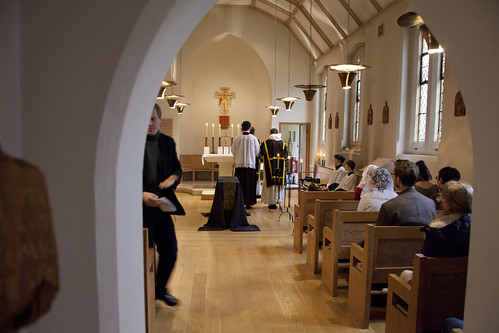
Celebrated by Fr Edward van den Burgh of the London Oratory, assisted by Fr Nicholas Edmunds-Smith of the Oxford Oratory and Br Albert Robertson OP.
Mass was accompanied by the Schola Abelis of Oxford under Dominic Bevan.
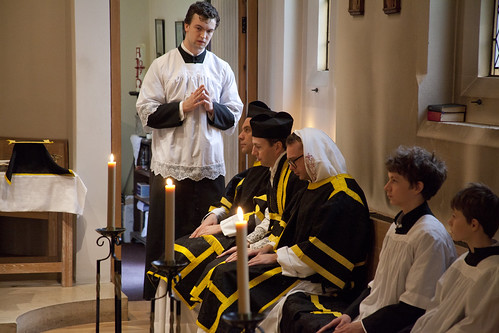

Celebrated by Fr Edward van den Burgh of the London Oratory, assisted by Fr Nicholas Edmunds-Smith of the Oxford Oratory and Br Albert Robertson OP.
Mass was accompanied by the Schola Abelis of Oxford under Dominic Bevan.

Saturday, November 18, 2017
The New Age and the Old Mass
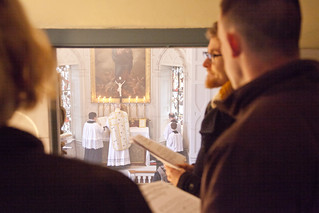 |
| Milton Manor House, Oxfordshire |
A few years ago on the LMS Walking Pilgrimage to Walsingham I noticed that four of my fellow pilgrims were converts to the Catholic faith from Buddhism. Buddhism is not a major religion in the UK, so the coincidence was rather remarkable. Indeed, in a number of obvious ways Buddhism presents a very marked contrast to Catholicism, and traffic between Buddhism and Catholicism tends to flow the other way. In fact, three out of these four pilgrims had been Western converts to Buddhism, before they came to the Catholic Church.
Buddhism in the West is part of a wider phenomenon, of the attraction posed by eastern spirituality to post-Christin or nominally Christian westerners. This eastern spirituality is often somewhat re-packaged for western tastes, and only the most serious-minded go the whole hog and become Buddhists. Far more popular are the (apparently) nice bits of eastern spirituality, such as reincarnation and the idea of self-realisation, without the asceticism and the infinitessimal prospects of success. Add these to a bit of Tarot-reading, Astrology, the 'all-religions-are-one' dogma of Freemasonry, and other bits of Western-inspired clap-trap, and you have the New Age Movement. This soup of influences is united by the idea that we can free ourselves from soul-cramping restrictions imposed by bad upbring, traditions, and habits, by spiritual techniques, such as meditation, perhaps aided by Yoga, or maybe even drugs.
Friday, November 17, 2017
Bishop Li, semper fidelis, dies at 97
 |
| Bishop Li in 2013 |
Bishop Luke Li Jingfeng of Fenghsiang, an 'underground' bishop consectrated secretly, died this morning (11:20pm GMT), aged 97. Please pray for him.
Bp. Li was a pillar of traditionalism, as well as of true fidelity to the See, in the Chinese speaking Church.
In his nineties he translated the 1962 missal into Chinese, to aid Chinese speaking clergy in the understanding of the prayers. This massive project will continue to be of great significance for Chinese Catholics far into the future.
On a more personal level, he and some of the priests in his diocese gave the old mass movement much support.
The Novus Ordo Missae was not introduced into China until the 1980s, so there remains a generation of priests who were taught the the ancient Mass in seminary. See the FIUV Position Paper on the Extraordinary Form and China.
Support the work of the LMS by becoming an 'Anniversary Supporter'.
Monday, November 13, 2017
Annual Requiem in St Benet's Hall, Oxford
A High Mass of Requiem will be celebrated in the chapel of St Benet's Hall, Oxford, on Saturday 18th November at 11:30am.
All are welcome.
St Benet's is at 38 St Giles, Oxford OX1 3LN.
Support the work of the LMS by becoming an 'Anniversary Supporter'.
Saturday, November 11, 2017
Priest Training Conference, Low Week 2018
The LMS Priest Training Conference is back! It didn't happen last year because of the late Easter (Low Week was in term time at our venue, Prior Park).
Details and booking here.
Support the work of the LMS by becoming an 'Anniversary Supporter'.
Details and booking here.
The Latin Mass Society will be holding a residential training conference for priests, deacons, seminarians and laymen wishing to learn to celebrate or serve Mass in the Extraordinary Form. It will be held at Prior Park College near Bath from Monday 9th April to Thursday 12th April 2018.

Tuition will be in small groups. For clergy and seminarians, this will be provided by priests experienced in the Extraordinary Form, for servers this will be provided by laymen with years of experience in the Extraordinary Form.

Tuition will be in small groups. For clergy and seminarians, this will be provided by priests experienced in the Extraordinary Form, for servers this will be provided by laymen with years of experience in the Extraordinary Form.
Low Mass, Missa Cantata and Solemn Mass will be covered, although participants will be expected to be proficient at Low Mass before progressing to the more complicated forms.
No previous experience is necessary, and participants will be divided into groups, according to their abilities.
There will be daily Mass intended to be an example of best practice.
 The conference will start after lunch on the Monday and conclude before lunch on the Thursday.
The conference will start after lunch on the Monday and conclude before lunch on the Thursday.
 The conference will start after lunch on the Monday and conclude before lunch on the Thursday.
The conference will start after lunch on the Monday and conclude before lunch on the Thursday.
Full board and lodging is provided in basic single rooms (not en suite).
Lunch on the Monday and the Thursday can be booked at extra cost, £5 per lunch for all participants.
The fee for attending is: £120.00
Full-time students: £60
Seminarians: FREE OF CHARGE
Full-time students: £60
Seminarians: FREE OF CHARGE
To book your place on the Training Conference, please complete the form below and submit your payment using the paypal buttons; credit and debit cards are accepted through paypal.
Friday, November 10, 2017
Autumn Mass of Ages now available

In this issue:
• Bishop Michael Campbell OSA, Bishop of Lancaster, leads us in to the great liturgical seasons of Advent and Christmas with a thought-provoking meditation
• John Coverdale reports on a magnificent work of restoration at St Augustine’s, Ramsgate
• In our series on Catholic traditions, Joseph Shaw looks at the history of the Christmas crib
•There is a review of Leo Darroch’s new book Una Voce: The History of the Foederatio Internationalis Una Voce 1964-2003 (copies of which can be purchased from our website) and much, much more.
Feature on St Augustine's, Ramsgate:
"Augustus Pugin is a name that should be on the lips of every Catholic in England... He became one of the most influential architects and designers of the nineteenth century, championing Catholicism and the Gothic style in everything…
"He said that building a church was the greatest thing a man can do, and that is precisely what he did in Ramsgate. For the greater glory of God, he created this ideal church where God could be worshipped according to the ancient rites of our Holy Mother the Church.”
Feature on St Augustine's, Ramsgate:
"Augustus Pugin is a name that should be on the lips of every Catholic in England... He became one of the most influential architects and designers of the nineteenth century, championing Catholicism and the Gothic style in everything…
"He said that building a church was the greatest thing a man can do, and that is precisely what he did in Ramsgate. For the greater glory of God, he created this ideal church where God could be worshipped according to the ancient rites of our Holy Mother the Church.”
Thursday, November 09, 2017
Developments at Holy Trinity, Hethe, and Spetchley Park
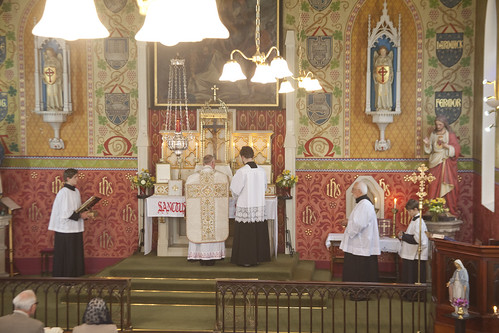 |
| The highly decorated interior of Holy Trinity, Hethe. |
After a short break, however, he will celebrate his first Sunday Mass in Holy Trinity, Hethe, near Bicester, on Sunday 7th January (updated).
Fr Talbot will be missed in Spetchley, but welcomed in Hethe! This will bring to an end the current situation of a rota of priests serving this Sunday Mass, at 12 noon, which was established three years ago by the Parish Priest Fr Paul Lester. These Masses are sung on the 2nd and 4th Sundays of the month.
Support the work of the LMS by becoming an 'Anniversary Supporter'.
Sunday, November 05, 2017
LMS Annual Requiem in Westminster Cathedral: Pictures
Saturday, November 04, 2017
Correctio Filialis: it's not going away
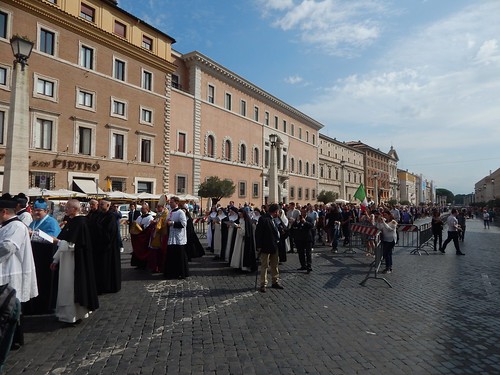 |
The traddies on the march: the Summorum Pontificum Pilgrimage in Rome marking the
10th anniversary of Summorum Pontificum. It turns out this is just the vanguard.
|
Not all readers may understand the significance of this, so allow me to fill in the background. Dr Popcak, as he explains in the article, is not only a 'pastoral counsellor', but is head of a major centre of pastoral counselling, and trains pastoral counsellors. The Church in the United States has the resources (and of course the needs) to maintain an entire industry of pastoral counselling. Maybe I'm too English, or too traditional (I'd rather talk to a priest), but this kind of thing isn't really my kind of thing. But that's just the point. This industry of pastoral counselling going on over the pond has got absolutely nothing to do with an interest in the Traditional Mass, which some people are now trying to suggest is the common factor in opposition to liberal interpretations of Amoris laetitia. Well, they couldn't be more wrong. This guy is from the centre of the 'conservative', Pope St John Paul II-focused, mainstream, establishment Catholic world, and the Patheos platform, which has hosted a good many attacks on traditional Catholics over the years, is this world's in-house magazine.
Labels:
Amoris laetitia,
Correctio Filialis,
Pope Francis
Friday, November 03, 2017
ICKSP Sisters arriving in England

The date has now been fixed for the arrival in England of a group of Sister Adorers of the Royal Heart of Jesus, who will establish a community alongside the Institute of Christ the King Sovereign Priest apostolate in Lancaster Diocese.
The sisters are a community of contemplative nuns dedicated to reparation and adoration of the Royal Heart of Jesus Christ Sovereign Priest. Leading a non-cloistered contemplative life, the sisters offer their daily prayers and sacrifices particularly for the priests of the Institute and the souls entrusted to them.
This is a tremendously important development for the Traditional movement in England and Wales. You can read more about the Sisters here.


Support the work of the LMS by becoming an 'Anniversary Supporter'.
All Saints and All Souls in Oxford and Didcot
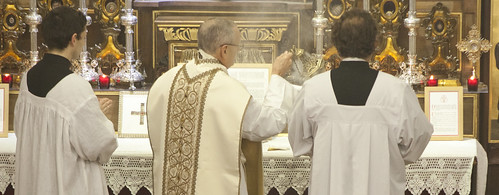
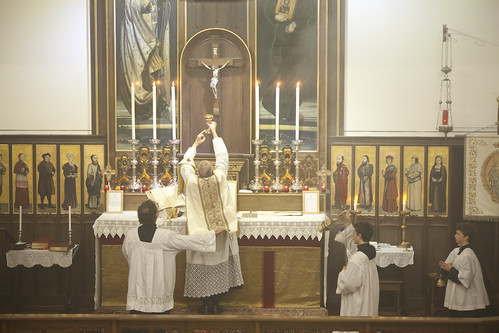
I sang in SS Gregory & Augustine in Oxford for All Souls, for the Priest in Charge, Fr John Saward (above), and the following day, for All Souls, in Didcot at the Church of the English Martyrs for the Parish Priest, Fr Phillip Harris. I think the latter was probably the first Traditional Sung Mass in the church since the 'changes'. It was a privilege to be of service to Fr Harris in his bringing the Traditional Mass to his parish and his (enormous) church, one of the great things which Latin Mass Society volunteers can do. Fr Harris celebrates Low Mass in English Martyrs most Wednesday evenings.
Wednesday, November 01, 2017
Fr Thomas Weinandy, Capuchin theologian, criticises Pope Francis
Update: read Fr Weinandy's letter to Pope Francis (made public only after the Pope declined to respond, since July) with a very interesting account of how he decided to write it (scroll down) here.
He has, of course, now been sacked from his position as advisor to the US bishops.
----------------
This caught my eye on Crux partly because Fr Weinandy used to be in Oxford, as head of Greyfriars. It is interesting because Fr Weinandy is something of an establishment figure: a former advisor to the US Bishops' Conference, a member of the International Theological Commission, and a senior member of his order, the Capuchin Franciscans, who aren't exactly traddy bad-boys. And here it is, being reported on John Allen's website, Crux.
It is one of a number of indications that the theological establishment in the United States is not happy with the direction of travel under Pope Francis.
Support the work of the LMS by becoming an 'Anniversary Supporter'.
He has, of course, now been sacked from his position as advisor to the US bishops.
----------------
This caught my eye on Crux partly because Fr Weinandy used to be in Oxford, as head of Greyfriars. It is interesting because Fr Weinandy is something of an establishment figure: a former advisor to the US Bishops' Conference, a member of the International Theological Commission, and a senior member of his order, the Capuchin Franciscans, who aren't exactly traddy bad-boys. And here it is, being reported on John Allen's website, Crux.
It is one of a number of indications that the theological establishment in the United States is not happy with the direction of travel under Pope Francis.
------------------
A former chief of staff for the U.S. bishops’ Committee on Doctrine, and a current member of the Vatican’s International Theological Commission, has written Pope Francis to say that his pontificate “has given those who hold harmful theological and pastoral views the license and confidence to come into the light and expose their previously hidden darkness,” which, one day, will have to be corrected.While expressing loyalty to Francis as the “Vicar of Christ on earth, the shepherd of his flock,” Capuchin Father Thomas Weinandy nevertheless charges that the pope is:
- Fostering “chronic confusion.”
- “Demeaning” the importance of doctrine.
- Appointing bishops who “scandalize” believers with dubious “teaching and pastoral practice.”
- Giving prelates who object the impression they’ll be “marginalized or worse” if they speak out.
- Causing faithful Catholics to “lose confidence in their supreme shepherd.”
“In recognizing this darkness, the Church will humbly need to renew itself, and so continue to grow in holiness,” Weinandy wrote in the letter, which is dated July 31, the feast of St. Ignatius Loyola, founder of the pope’s Jesuit order.
Read the whole story on CruxSupport the work of the LMS by becoming an 'Anniversary Supporter'.
Tuesday, October 31, 2017
Pray for the dead this November
 The Latin Mass Society is selling the perfect collection of prayers this November: prayers for the Faithful Departed, taken from the Raccolta, the old official manual of indulgenced prayers, which was filled with prayers for all occasions authorised and encouraged by the Holy See.
The Latin Mass Society is selling the perfect collection of prayers this November: prayers for the Faithful Departed, taken from the Raccolta, the old official manual of indulgenced prayers, which was filled with prayers for all occasions authorised and encouraged by the Holy See.Single prayers, prayers for every day of the week, prayers for the bereaved, can all be found in this handy little book.
Yours for £1.95 and not available anywhere else.
Support the work of the LMS by becoming an 'Anniversary Supporter'.
Monday, October 30, 2017
What everyone wants to see...
Friday, October 27, 2017
Mass in Long Crendon tomorrow (28th Oct)
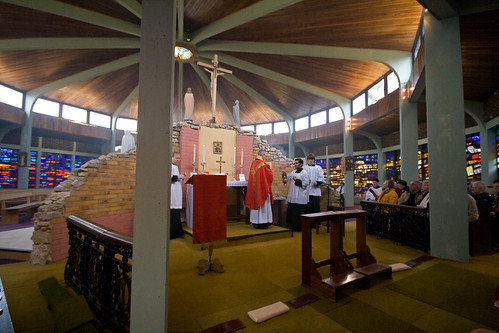 |
| The last time the EF was celebrated in the church, back in 2009. |
The address of the church is 4 Chearsley Rd, Long Crendon, Aylesbury HP18 9BS
It will be celebrated by Fr Anthony Conlon, and accompanied with chant by the Schola Abelis of Oxford.
Support the work of the LMS by becoming an 'Anniversary Supporter'.
Thursday, October 26, 2017
Remembrance Sunday
Remembrance Sunday, 12th November, is coming up in the UK: the Sunday nearest to the 11th of November, the date the First World War ended, when by longstanding permission priests in England and Wales are allowed to celebrate a Requiem Mass for our war dead.
There will be truly worthy sung celebrations of the ancient Mass for the Dead in the Birmingham Oratory, and in St William of York, Reading, with the Fraternity of St Peter.
Those locations are about 100 miles apart, or a two hour drive. Between them, the only place where you will find a Sung, Vetus Ordo Requiem Mass on Sunday will be in Holy Trinity, Hethe, at 12 noon (click for a map).
This is the oldest Catholic parish church in Oxfordshire, noted for the beauty of its decorations. Mass will be celebrated by Mgr Bruce Harbert, the well-known liturgical scholar, and the singing will be led by Dominic Bevan.
Please join us to pray for the war dead, some of whom are buried in the graveyard next to this church.
Support the work of the LMS by becoming an 'Anniversary Supporter'.
A renewed attack on celibacy?
Reposted from December 2015
-----------------------------------------
The word is out that the next subject for discussion at a Synod of Bishops will be celibacy. I don't know if this is true, but it is worth reminding ourselves of exactly why the Latin Church (as opposed to the Byzantine, Maronite etc. churches) should not abandon celibacy.
A while ago I wrote a short series of posts on the topic:
The Crisis of Celibacy
The Attack on Celibacy is an Attack on the Priesthood
The Attack on Celibacy is an Attack on Marriage
Here are a few points from those posts.
First, we have come to this stage in the debate because, in a series of choices between strengthening or weakening celibacy, the Church's leadership has chosen to weaken it. These decisions have been understandable - it is important to stress that, taken individually, they may seem inevitable, or even laudable - but the cumulative effect has been to erode the principle of priestly celibacy. Examples of such decisions have been: the giving way to the massive departure of priests from their vows, and the moral support given by bishops to laicised priests, including groups calling openly for the end of celibacy; the promotion of married deacons, and the endemic confusion about deacons' obligations; the taking over of various liturgical functions by lay people, including women; and concessions made to former Anglican (and occasionally Lutheran) convert clergy.
-----------------------------------------
The word is out that the next subject for discussion at a Synod of Bishops will be celibacy. I don't know if this is true, but it is worth reminding ourselves of exactly why the Latin Church (as opposed to the Byzantine, Maronite etc. churches) should not abandon celibacy.
A while ago I wrote a short series of posts on the topic:
The Crisis of Celibacy
The Attack on Celibacy is an Attack on the Priesthood
The Attack on Celibacy is an Attack on Marriage
Here are a few points from those posts.
First, we have come to this stage in the debate because, in a series of choices between strengthening or weakening celibacy, the Church's leadership has chosen to weaken it. These decisions have been understandable - it is important to stress that, taken individually, they may seem inevitable, or even laudable - but the cumulative effect has been to erode the principle of priestly celibacy. Examples of such decisions have been: the giving way to the massive departure of priests from their vows, and the moral support given by bishops to laicised priests, including groups calling openly for the end of celibacy; the promotion of married deacons, and the endemic confusion about deacons' obligations; the taking over of various liturgical functions by lay people, including women; and concessions made to former Anglican (and occasionally Lutheran) convert clergy.
Wednesday, October 25, 2017
LMS Pilgrimage to the Holy Land
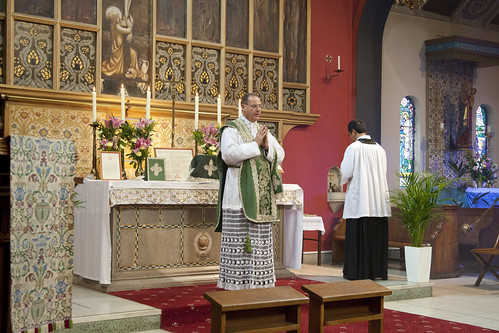 |
| Fr Martin Edwards celebrating Mass in his church of St Mary Magdalen, Wandsworth |
Fr Martin Edwards, Parish Priest of St Mary Magdalen’s Wandsworth, will be leading a pilgrimage to the Holy Land 10th-18th November 2017, with a daily Traditional Mass at the holy sites.
Flying from Heathrow on Friday 10th November, among the places pilgrims will visit during the eight day pilgrimage are Bethlehem, Mount of Olives, Mount Zion, Jerusalem, Qumran, Dead Sea, Galilee, Acre, Cana and Nazareth.
Unlike other pilgrimages to the Holy Land, this pilgrimage will have a Traditional Latin Mass every day. The cost is £1,369.
The pilgrimage is organised by Pax Travel and a full itinerary can be downloaded here.
Support the work of the LMS by becoming an 'Anniversary Supporter'.
LMS Annual Requiem Sat 4th Nov
 |
| Bishop Jabale at the Cataphalque in 2016 (Photo: John Aron) |
It will be Pontifical High Mass; the celebrant will be the Rt Rev. Mark Jabalé O.S.B., Emeritus Bishop of Menevia, with the assistance of priests from the Institute of Christ the King Sovereign Priest.
Sunday, October 22, 2017
The Dominican Rite for the Latin Mass Society in Oxford
Yesterday was the annual LMS Pilgrimage to Oxford in honour of the city's Catholic martyrs. This year we visited the site of the martyrdom of Bl George Napier, the Castle Gallows, where he had his eternal nativity in 1610, after many years of ministering as a priest in his native Oxford, and the surrounding area.
Saturday, October 21, 2017
More on Pope Francis and doctrinal development
I've been included in a panel of academics interviewed for LifeSiteNews on the subject of doctrinal development, in light of Pope Francis' remarks on the Death Penalty.
An extract:
Shaw said so-called “conservative” Catholics would be especially susceptible to a change in Catholic teaching on capital punishment.
“Pope St John Paul II was clearly personally opposed to capital punishment and campaigned for its abolition. While he was careful never to claim that the teaching of the Church ruled capital punishment out, his views have become strongly associated with the Catholic Church and have influenced many conservative Catholics,” he said.
“It may seem a relatively small step between what Pope St John Paul II claimed – that capital punishment was not wise or appropriate in the conditions of the modern world – and what Pope Francis is now claiming – that capital punishment is never ‘admissible,’ and that Catholics living in very different conditions from our own were wrong to make recourse to it.”
“However, it is obviously a huge step to say that the Church herself was wrong in her consistent teaching, which has always been that capital punishment can be legitimate,” he added.
Read the whole thing there.
Support the work of the LMS by becoming an 'Anniversary Supporter'.
An extract:
Shaw said so-called “conservative” Catholics would be especially susceptible to a change in Catholic teaching on capital punishment.
“Pope St John Paul II was clearly personally opposed to capital punishment and campaigned for its abolition. While he was careful never to claim that the teaching of the Church ruled capital punishment out, his views have become strongly associated with the Catholic Church and have influenced many conservative Catholics,” he said.
“It may seem a relatively small step between what Pope St John Paul II claimed – that capital punishment was not wise or appropriate in the conditions of the modern world – and what Pope Francis is now claiming – that capital punishment is never ‘admissible,’ and that Catholics living in very different conditions from our own were wrong to make recourse to it.”
“However, it is obviously a huge step to say that the Church herself was wrong in her consistent teaching, which has always been that capital punishment can be legitimate,” he added.
Read the whole thing there.
Support the work of the LMS by becoming an 'Anniversary Supporter'.
Friday, October 20, 2017
A friendly warning to Opus Dei
 I don't want to single out Opus Dei; what I have to say is applicable to a number of conservative Catholic organisations. But Opus Dei does rather single out itself.
I don't want to single out Opus Dei; what I have to say is applicable to a number of conservative Catholic organisations. But Opus Dei does rather single out itself.We had the organisations 'number 2', the Vicar General, Mgr Mariano Fazio, criticising the Filial Correction for 'correcting a father in public':
Any faithful, bishop, cardinal, lay person has the right to tell the pope what he sees fit for the good of the Church. But it seems to me that he has no right to do so publicly and to scandalize the whole Church with these manifestations of disunity.
I've responded to that in the linked LifeSite article.
Mgr Fazio is simply following, however, the line of the head of Opus Dei himself, Mgr Fernando Ocariz, who wrote an article for L'Osservatore Romano on December 2, 2011, indicating the kind of obedience which the documents of the Second Vatican Council have: remarks which presumably cover any reasonably high-level official documents of the Church.
Thursday, October 19, 2017
‘Pro-Pope Francis’ petition launched
A German-based petition praising Pope Francis has been launched, signed by a handful of bishops
and about 100 theologians and others.
The text of the petition itself is vague: it
simply expresses support for Pope Francis' ‘initiatives’ and ‘leadership’. It is
interesting, therefore, that despite appearing first on the website of the
German Bishops’ Conference — which suggests some kind of official endorsement — so few German
bishops have added their names. Indeed, the episcopal
signatories one does find are either retired or are auxiliary bishops. It adds to the sense that
even quite liberal bishops, who have dioceses to consider, are a bit concerned
about the crisis, and are wary of simply throwing themselves into battle on the
liberalising side. Every now and then a bishop makes a statement of enthusiasm
for a liberal interpretation of Amoris laetitia — the other day it was
Cardinal Barbarin’s turn — but these remain very much the exception, not the
rule.
Labels:
Amoris laetitia,
Correctio Filialis,
Pope Francis
Wednesday, October 18, 2017
Oxford Pilgrimage this Saturday
Sunday, October 15, 2017
Ultramontanism's Death Sentence
 |
| Pope Pius XII |
In 1952 Pope Pius XII said the following, in a public address recorded among his official acts:
Even when it is a question of the execution of a condemned man, the State does not dispose of the individual's right to life. In this case it is reserved to the public power to deprive the condemned person of the enjoyment of life in expiation of his crime when, by his crime, he has already disposed himself of his right to live.
Subscribe to:
Comments (Atom)



